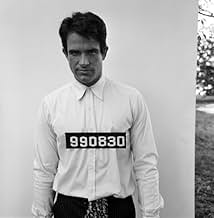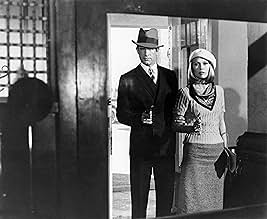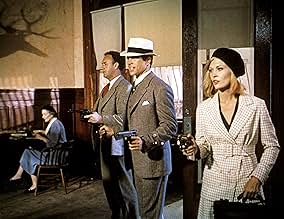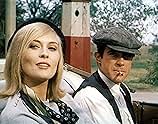अपनी भाषा में प्लॉट जोड़ेंBored waitress Bonnie Parker falls in love with an ex-con named Clyde Barrow and together they start a violent crime spree through the country, stealing cars and robbing banks.Bored waitress Bonnie Parker falls in love with an ex-con named Clyde Barrow and together they start a violent crime spree through the country, stealing cars and robbing banks.Bored waitress Bonnie Parker falls in love with an ex-con named Clyde Barrow and together they start a violent crime spree through the country, stealing cars and robbing banks.
- 2 ऑस्कर जीते
- 22 जीत और कुल 29 नामांकन
Martha Adcock
- Bank Customer
- (बिना क्रेडिट के)
Harry Appling
- Bonnie's Uncle
- (बिना क्रेडिट के)
Garrett Cassell
- Cop
- (बिना क्रेडिट के)
Mabel Cavitt
- Bonnie's Mother
- (बिना क्रेडिट के)
Patrick Cranshaw
- Bank Teller
- (बिना क्रेडिट के)
Frances Fisher
- Bonnie's Aunt
- (बिना क्रेडिट के)
Sadie French
- Bank Customer
- (बिना क्रेडिट के)
Garry Goodgion
- Billy
- (बिना क्रेडिट के)
कहानी
क्या आपको पता है
- ट्रिवियाWhen Warren Beatty was on-board as producer only, his sister Shirley MacLaine was a strong possibility to play Bonnie. But when Beatty decided to play Clyde himself, for obvious reasons he decided not to use MacLaine.
- गूफ़The film portrays Texas Ranger Frank Hamer as a vengeful bungler who had been captured, humiliated, and released by Bonnie and Clyde. In reality, Hamer was already a legendary Texas Ranger when he was coaxed out of semi-retirement to hunt down the duo. He never met either of them until he and his posse successfully ambushed and killed them near Gibsland, Louisiana, in 1934. In 1968, Hamer's widow and son sued the movie producers for defamation of character over his portrayal and were awarded an out-of-court settlement in 1971.
- भाव
Clyde Barrow: This here's Miss Bonnie Parker. I'm Clyde Barrow. We rob banks.
- इसके अलावा अन्य वर्जनSeveral scenes (most of which can be read in the film's script) were shot but removed or altered for various reasons, either for content or to keep the running time under two hours. These scenes are, in chronological order:
- The earliest versions had Clyde shooting and killing the butcher during their fight. This was toned down to Clyde just shooting the butcher, and finally just pistol whipping him. In real life, speculation still exists as to whether Clyde Barrow actually committed the crime this is based on; although his photo was picked out, the method in which it was executed doesn't fit his MO. In the final cut, there is a brief jump in the film during the fight, where it was spliced from the original, more graphic conclusion.
- After picking up C.W., Clyde and Bonnie take him to a diner where they plan their next robbery.
- After Clyde kills Doyle Johnson (the man on the running board), Bonnie talks with CW in the bathroom while Clyde cleans his guns and laments his actions. In the bathroom CW bathes and Bonnie attempts to seduce him, but changes her mind when CW proves to be less than romantic material. A still from this scene-- Bonnie wearing a slip and Clyde's hat-- can be seen on the DVD.
- A longer scene of Buck and Blanche's approach to the motor lodge. Buck is singing Bible hymns and Blanche scolds him for bringing her to see Clyde.
- A longer version of Bonnie's visit home; she sits in the car and her sister gives her a perm (a portion of this-- Bonnie on the running board getting her hair put up-- exists in the final film).
- A very long sequence in which Bonnie and Clyde get drunk and come to terms with their impending death. They trash their room and rip out the mattress from their bed, turning it into a makeshift coffin. They then put on their best clothes and put makeup on each other so they can see what they will look like when they're dead. The scene concludes with Bonnie and Clyde dancing around CW by candlelight and chanting "The Hearse Song."
- During the Platte City raid, C.W. uses a machine gun to attack the armored car instead of grenades.
- The final shootout, in its earliest form, was done entirely with still photos shown over sounds of machine gun fire and screams, and we never actually saw Bonnie or Clyde dead. The movie ended with the two farmers running towards the car while "Foggy Mountain Breakdown" Played in the background.
- कनेक्शनFeatured in The 40th Annual Academy Awards (1968)
- साउंडट्रैकDeep Night
Music by Charles Henderson
Lyrics by Rudy Vallee
Performed by Rudy Vallee
(heard over the opening credits)
फीचर्ड रिव्यू
Went to search for this movie online so I could review it and almost typed "Bonnie and Tyler" into the search bar. It's been a long day, so this one will be brief.
Bonnie and Clyde is mostly a great movie. I have all the admiration in the world for what it did for cinema. It helped kickstart the idea of having violence actually be messy and impactful in mainstream film, and the fact that it's a sympathetic portrayal of people on the run from the law was probably quite shocking back then.
If anything, however, Bonnie and Clyde feel more like heroes than anti-heroes. They rob banks; faceless organisations that are foreclosing people's houses and making The Depression more depressing. They have few other ways to get by. There are police casualties, but the police response is often excessively violent, and they're tools of a state who seem to be doing little else to help the people who are suffering in the 1930s.
Bonnie and Clyde and their gang aren't perfect people by any means, but they are more likable than those who they're pitted against. Within the last few years, figures like them stray further and further from the anti-hero label, and closer towards the hero one.
There's some really bold editing here, and the lead performances are all good (fantastic Gene Wilder appearance, too). The character of Blanche is a bit annoying, though. I wish the screenplay had toned her down a bit. The music and a couple of jarring editing techniques might not work for everyone, too, and I think the pace gets a little janky here and there.
But for the stuff this movie does well, I feel it's at least deserving of an 8/10 rating. It's not my favourite landmark boundary-pusher of the late 1960s, but it's up there.
I said I'd be brief, but that didn't end up happening. Guess there's a lot to talk about when it comes to a movie like Bonnie and Clyde.
Bonnie and Clyde is mostly a great movie. I have all the admiration in the world for what it did for cinema. It helped kickstart the idea of having violence actually be messy and impactful in mainstream film, and the fact that it's a sympathetic portrayal of people on the run from the law was probably quite shocking back then.
If anything, however, Bonnie and Clyde feel more like heroes than anti-heroes. They rob banks; faceless organisations that are foreclosing people's houses and making The Depression more depressing. They have few other ways to get by. There are police casualties, but the police response is often excessively violent, and they're tools of a state who seem to be doing little else to help the people who are suffering in the 1930s.
Bonnie and Clyde and their gang aren't perfect people by any means, but they are more likable than those who they're pitted against. Within the last few years, figures like them stray further and further from the anti-hero label, and closer towards the hero one.
There's some really bold editing here, and the lead performances are all good (fantastic Gene Wilder appearance, too). The character of Blanche is a bit annoying, though. I wish the screenplay had toned her down a bit. The music and a couple of jarring editing techniques might not work for everyone, too, and I think the pace gets a little janky here and there.
But for the stuff this movie does well, I feel it's at least deserving of an 8/10 rating. It's not my favourite landmark boundary-pusher of the late 1960s, but it's up there.
I said I'd be brief, but that didn't end up happening. Guess there's a lot to talk about when it comes to a movie like Bonnie and Clyde.
- Jeremy_Urquhart
- 23 अक्तू॰ 2022
- परमालिंक
टॉप पसंद
रेटिंग देने के लिए साइन-इन करें और वैयक्तिकृत सुझावों के लिए वॉचलिस्ट करें
विवरण
- रिलीज़ की तारीख़
- कंट्री ऑफ़ ओरिजिन
- आधिकारिक साइट
- भाषा
- इस रूप में भी जाना जाता है
- Bonnie und Clyde
- फ़िल्माने की जगहें
- Red Oak, टेक्सस, संयुक्त राज्य अमेरिका(Bank Robbery)
- उत्पादन कंपनियां
- IMDbPro पर और कंपनी क्रेडिट देखें
बॉक्स ऑफ़िस
- बजट
- $25,00,000(अनुमानित)
- दुनिया भर में सकल
- $1,475
- चलने की अवधि1 घंटा 51 मिनट
- ध्वनि मिश्रण
- पक्ष अनुपात
- 1.85 : 1
इस पेज में योगदान दें
किसी बदलाव का सुझाव दें या अनुपलब्ध कॉन्टेंट जोड़ें





















